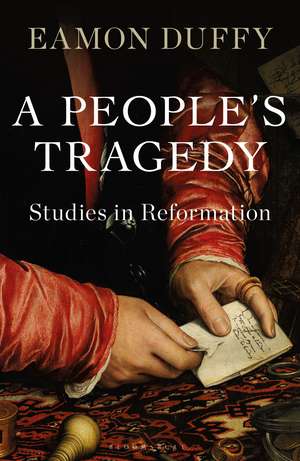A People’s Tragedy: Studies in Reformation
Autor Professor Eamon Duffyen Limba Engleză Hardback – 25 noi 2020
Preț: 98.82 lei
Preț vechi: 128.24 lei
-23% Nou
Puncte Express: 148
Preț estimativ în valută:
18.91€ • 19.79$ • 15.74£
18.91€ • 19.79$ • 15.74£
Carte disponibilă
Livrare economică 08-22 martie
Livrare express 25 februarie-01 martie pentru 61.63 lei
Preluare comenzi: 021 569.72.76
Specificații
ISBN-13: 9781472983855
ISBN-10: 1472983858
Pagini: 272
Dimensiuni: 153 x 234 x 31 mm
Greutate: 0.54 kg
Editura: Bloomsbury Publishing
Colecția Bloomsbury Continuum
Locul publicării:London, United Kingdom
ISBN-10: 1472983858
Pagini: 272
Dimensiuni: 153 x 234 x 31 mm
Greutate: 0.54 kg
Editura: Bloomsbury Publishing
Colecția Bloomsbury Continuum
Locul publicării:London, United Kingdom
Caracteristici
This book shares common ground with Duffy's bestselling The Stripping of the Altars, his previous series of essays on medieval religious life around the time of the Reformation
Notă biografică
Professor Eamon Duffy is Emeritus Professor of the History of Christianity at the University of Cambridge and a Fellow of Magdalene College. He is the author of The Stripping of the Altars, Reformation Divided and Royal Books and Holy Bones and appears regularly on radio and television as an authority on religion and the Reformation in England.
Cuprins
List of IllustrationsProloguePart One: Studies in Reformation1 Cathedral Pilgrimage: The Late Middle Ages2 The Dissolution of Ely Priory3 1569: A People's Tragedy4 Douai, Rheims and the Counter-Reformation5 The King James Bible6 Richard Baxter, ReminiscentPart Two: Writing the Reformation7 Luther Through Catholic Eyes8 James Anthony Froude and the Reign of Queen Mary9 A.G. Dickens and the Medieval Church10 Walsingham: Reformation and Reconstruction11 Writing the Reformation: Fiction and FactionNotesIndexPlates
Recenzii
Erudite, readable and acerbic ... [a] historian who, almost 40 years after publishing his first book, is still at the very top of his game.
This very readable collection poses some profound questions about the use of the past and the relation between meticulous scholarship and our understanding of the episodes that have contributed so profoundly to the way in which we view the world in our own day.
This very readable collection poses some profound questions about the use of the past and the relation between meticulous scholarship and our understanding of the episodes that have contributed so profoundly to the way in which we view the world in our own day.
